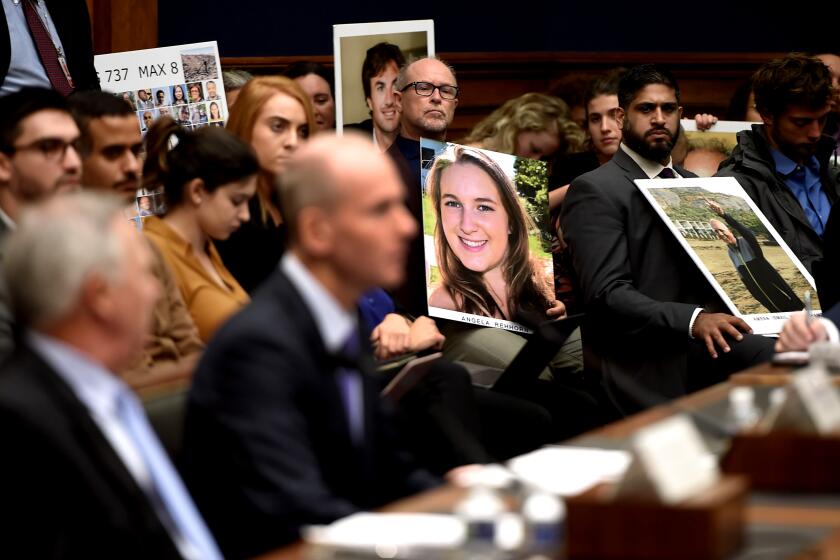Boeing may raise new debt as it faces additional 737 Max hurdles
- Share via
Boeing Co. is weighing a move to raise more debt as the company faces new complications over the return of its 737 Max planes to service.
Although Boeing had about $20 billion in available funds at the end of the third quarter, costs stemming from the Max crisis are increasing, the Wall Street Journal reported Monday. That has prompted the company to consider raising additional debt, the paper said, citing unidentified people familiar with the matter.
Boeing is halting output of the Max, which has yet to gain approval to resume service after two fatal crashes prompted a global flight ban in March. The production hiatus has reduced some costs, but it also means a longer wait for payments for finished planes. The Chicago company also faces compensation claims from airlines disrupted by the grounding, as well as from families of the crash victims.
The New York Times reported Sunday that Boeing was uncovering potential new problems with the plane that go beyond the initial software malfunctions that played a role in those crashes.
Meanwhile, American Airlines Group Inc. said it has reached a settlement with Boeing over the financial blow from the 737 Max grounding. The carrier said it would share about $30 million of the proceeds with employees.
The companies are still in talks over compensation for damages beyond 2019, American said. The Max’s absence since March shaved at least $540 million from American’s 2019 pretax income, the airline has said.
American is the second U.S. carrier after Southwest Airlines Co. to negotiate 2019 compensation with Boeing. American said it expects “substantially all” of the settlement to be in the form of reduced aircraft costs for grounded planes and future deliveries. Employees will receive their payment through the airline’s profit-sharing program in March.
The Federal Aviation Administration recently asked Boeing to review all possible ramifications of the changes it is making on the plane. During that review, Boeing discovered that bundles of electrical wiring in the plane were too close together and — at least in theory — raised the potential for a short circuit that could cause pilots to lose control of the plane.
“We identified this wiring-bundle issue and we are working with the FAA to perform the appropriate analysis,” Boeing spokesman Gordon Johndroe said Monday.
The company said, however, that it is too soon to know whether it will need to make any design changes, such as moving the wiring bundles farther apart. Boeing says it believes that other safeguards, including circuit breakers and insulation around the wiring, could be sufficient to prevent a short circuit from leading to another crash.
Boeing engineers have finished changes to a key software system called MCAS that was activated by faulty sensors in each crash, firmly pushing the noses of the planes down, a condition called runaway stabilizer.
Boeing has been working for more than a year to fix MCAS, which was designed partly to save the plane from aerodynamic stalls that could cause it to fall from the sky. Boeing is making the system less powerful and linking it to two sensors instead of one for extra protection against the kind of sensor failures that occurred before the crashes in Indonesia and Ethiopia.
U.S. regulators are considering requiring pilots to complete simulator training before they can operate the Max again, the Journal reported Sunday. The story cited government and industry officials familiar with the matter.
The Federal Aviation Administration originally rejected the idea because it would cause extra costs and delays for airlines, the Journal said. But in recent weeks, officials said there has been increased interest among agency and industry safety experts in requiring such training.
Analysts expect Boeing to raise as much as $5 billion in additional debt to help cover spending that may exceed $15 billion in the first half of the year, the Journal said. Funds would help maintain Max production facilities and finished planes, as well as close the $4-billion purchase of an 80% stake in Embraer’s airliner business.
Boeing Chief Executive Dennis Muilenburg was ousted last month. Next week David Calhoun, a board member who took over as chairman in October, will step into the chief executive role.
Shares of Boeing have tumbled about 21% since the second of the two plane crashes, which together killed 346 people. The stock rose 0.29% to $333.74 on Monday.
The Associated Press contributed to this report.
More to Read
Inside the business of entertainment
The Wide Shot brings you news, analysis and insights on everything from streaming wars to production — and what it all means for the future.
You may occasionally receive promotional content from the Los Angeles Times.











